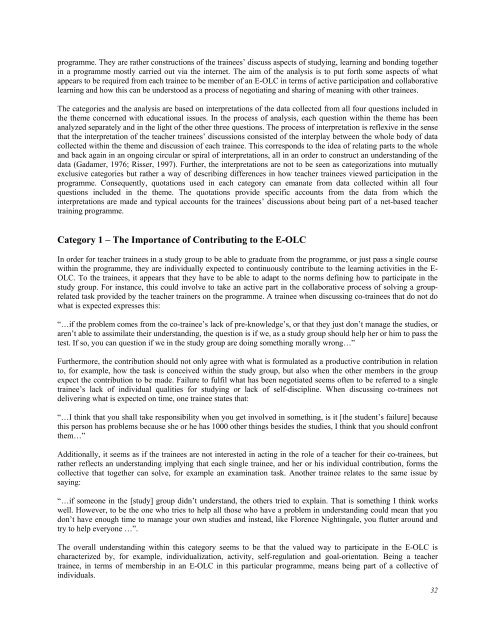October 2007 Volume 10 Number 4 - Educational Technology ...
October 2007 Volume 10 Number 4 - Educational Technology ...
October 2007 Volume 10 Number 4 - Educational Technology ...
Create successful ePaper yourself
Turn your PDF publications into a flip-book with our unique Google optimized e-Paper software.
programme. They are rather constructions of the trainees’ discuss aspects of studying, learning and bonding together<br />
in a programme mostly carried out via the internet. The aim of the analysis is to put forth some aspects of what<br />
appears to be required from each trainee to be member of an E-OLC in terms of active participation and collaborative<br />
learning and how this can be understood as a process of negotiating and sharing of meaning with other trainees.<br />
The categories and the analysis are based on interpretations of the data collected from all four questions included in<br />
the theme concerned with educational issues. In the process of analysis, each question within the theme has been<br />
analyzed separately and in the light of the other three questions. The process of interpretation is reflexive in the sense<br />
that the interpretation of the teacher trainees’ discussions consisted of the interplay between the whole body of data<br />
collected within the theme and discussion of each trainee. This corresponds to the idea of relating parts to the whole<br />
and back again in an ongoing circular or spiral of interpretations, all in an order to construct an understanding of the<br />
data (Gadamer, 1976; Risser, 1997). Further, the interpretations are not to be seen as categorizations into mutually<br />
exclusive categories but rather a way of describing differences in how teacher trainees viewed participation in the<br />
programme. Consequently, quotations used in each category can emanate from data collected within all four<br />
questions included in the theme. The quotations provide specific accounts from the data from which the<br />
interpretations are made and typical accounts for the trainees’ discussions about being part of a net-based teacher<br />
training programme.<br />
Category 1 – The Importance of Contributing to the E-OLC<br />
In order for teacher trainees in a study group to be able to graduate from the programme, or just pass a single course<br />
within the programme, they are individually expected to continuously contribute to the learning activities in the E-<br />
OLC. To the trainees, it appears that they have to be able to adapt to the norms defining how to participate in the<br />
study group. For instance, this could involve to take an active part in the collaborative process of solving a grouprelated<br />
task provided by the teacher trainers on the programme. A trainee when discussing co-trainees that do not do<br />
what is expected expresses this:<br />
“…if the problem comes from the co-trainee’s lack of pre-knowledge’s, or that they just don’t manage the studies, or<br />
aren’t able to assimilate their understanding, the question is if we, as a study group should help her or him to pass the<br />
test. If so, you can question if we in the study group are doing something morally wrong…”<br />
Furthermore, the contribution should not only agree with what is formulated as a productive contribution in relation<br />
to, for example, how the task is conceived within the study group, but also when the other members in the group<br />
expect the contribution to be made. Failure to fulfil what has been negotiated seems often to be referred to a single<br />
trainee’s lack of individual qualities for studying or lack of self-discipline. When discussing co-trainees not<br />
delivering what is expected on time, one trainee states that:<br />
“…I think that you shall take responsibility when you get involved in something, is it [the student’s failure] because<br />
this person has problems because she or he has <strong>10</strong>00 other things besides the studies, I think that you should confront<br />
them…”<br />
Additionally, it seems as if the trainees are not interested in acting in the role of a teacher for their co-trainees, but<br />
rather reflects an understanding implying that each single trainee, and her or his individual contribution, forms the<br />
collective that together can solve, for example an examination task. Another trainee relates to the same issue by<br />
saying:<br />
“…if someone in the [study] group didn’t understand, the others tried to explain. That is something I think works<br />
well. However, to be the one who tries to help all those who have a problem in understanding could mean that you<br />
don’t have enough time to manage your own studies and instead, like Florence Nightingale, you flutter around and<br />
try to help everyone …”.<br />
The overall understanding within this category seems to be that the valued way to participate in the E-OLC is<br />
characterized by, for example, individualization, activity, self-regulation and goal-orientation. Being a teacher<br />
trainee, in terms of membership in an E-OLC in this particular programme, means being part of a collective of<br />
individuals.<br />
32

















